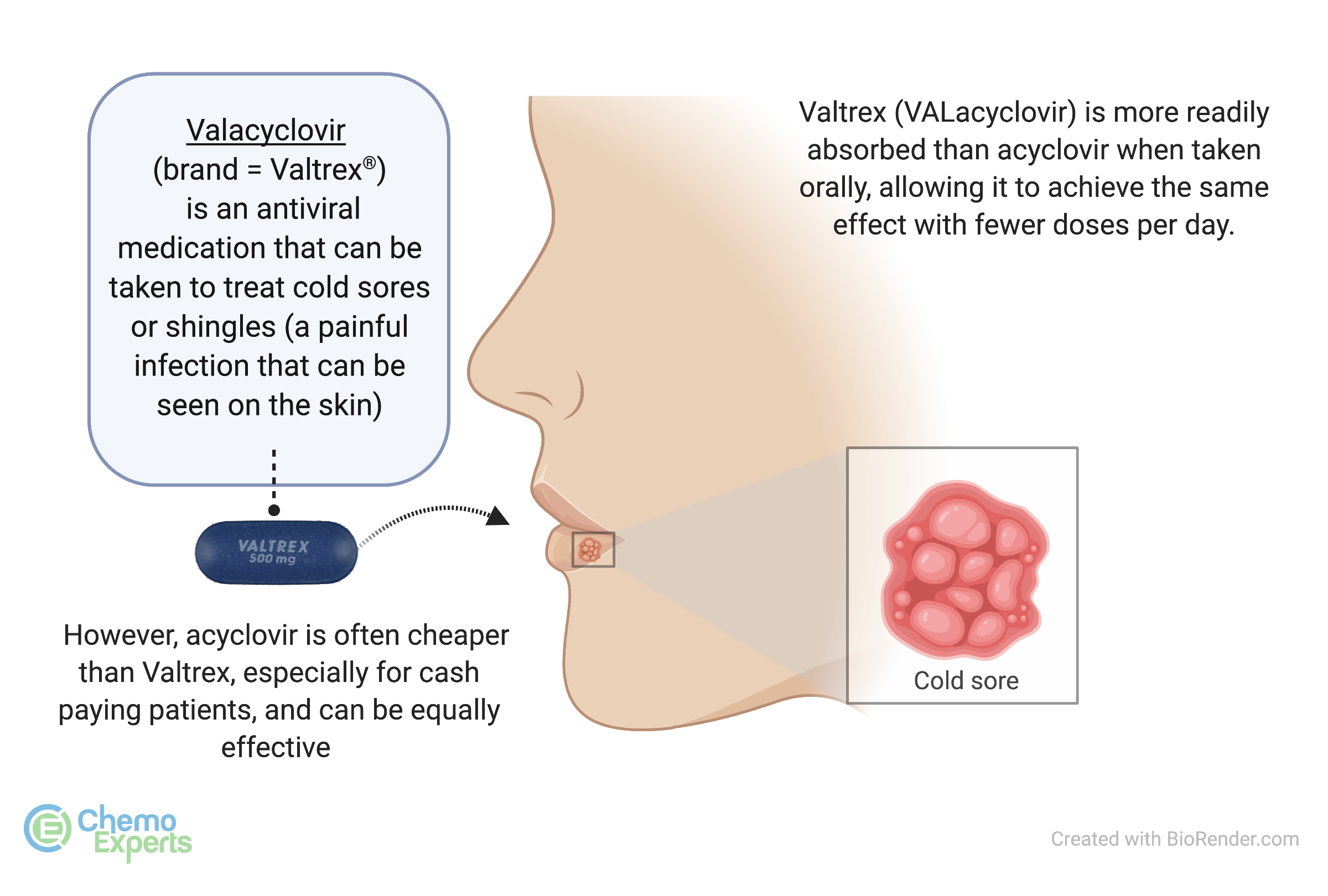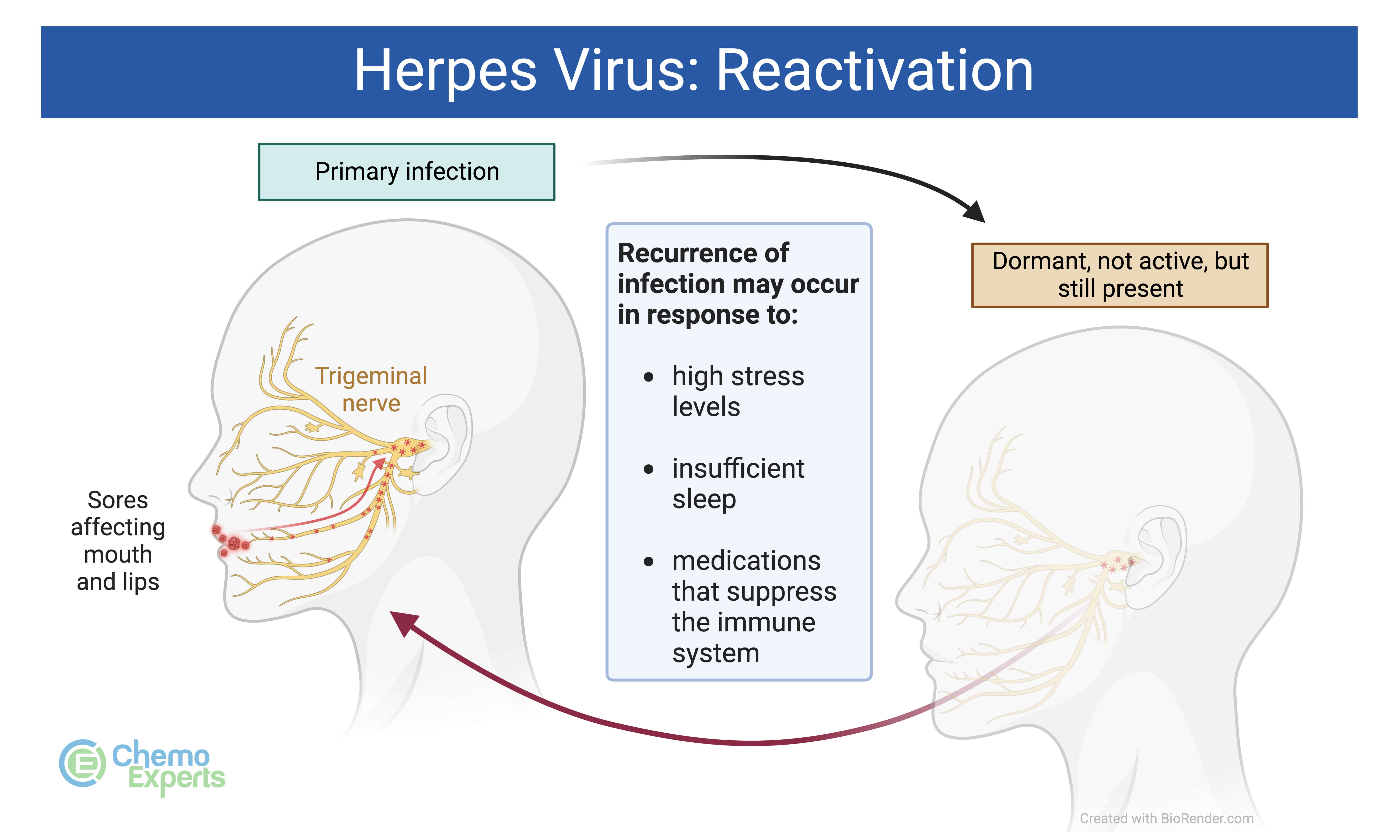Side Effect: Cold sores
What are cold sores?
Cold sores are tiny lesions that result from a common viral infection known as herpes simplex, otherwise known as HSV. The medical term for cold sores on the lips of the mouth is herpes labialis. Importantly, viral infections may appear on the inside of the mouth and may be mistaken for mucositis. In these instances, it is sometimes helpful to have a health care provider swab the area and send it for viral culture to see if anti-viral medication is needed.
What do cold sores look like?
Cold sores are eruptions of the skin that appear as tiny red blisters, and are often painful. They can appear on the lips, and may overlap the skin next to your lip.
Cold sores

Click to enlarge
Prevention of cold sores:
For people who get frequent cold sores, either acyclovir or valacyclovir can be taken to prevent cold sores from appearing during treatment
Treatment of cold sores:
The sooner valacyclovir (Valtrex®) or Acyclovir therapy is started, the higher the chance that it will work to make the cold sore go away faster. Therefore, if a cold sore appears it should be treated as soon as possible.
Who gets cold sores?
When the immune system is not functioning at full capacity, cold sores may appear. Common conditions that may weaken your immune system, which may increase your risk of a cold sore include, but are not limited to:
- Certain types of cancer
- Certain cancer treatments
- Immunosuppressant medications
- Stress
- Other infections, such as HIV
- Pre-existing immune system related problems, such as CVID

How long do cold sores last?
Cold sores usually last for a few days before they begin to heal, and often take more than a week before they disappear completely
How do you prevent cold sores?
For patients with recurrent cold sores or for those who will be receiving treatment that increases the risk of recurrent cold sores, preventative antiviral therapy, known as prophylaxis, may be offered:
- Common Acyclovir schedule TO PREVENT cold sores: Acyclovir 400mg - 800mg by mouth two times daily until told to stop by your doctor
- Acyclovir is removed from your body by the kidneys. If you have reduced kidney function, the dose or the number of times per day this is taken may be reduced to prevent a build-up of acyclovir in your body
- NOTE: The dose and duration of your prescription may differ based upon your doctor's experience and availability of clinical data
- Common Valacyclovir (Valtrex®) schedule TO PREVENT cold sores: Valacyclovir 500mg by mouth once or twice daily until told to stop by your doctor
How do you treat cold sores?
Early treatment with an antiviral medication, such as acyclovir or valacyclovir, will help the cold sore heal faster, often by several days.
- Common Acyclovir schedule TO TREAT cold sores: Acyclovir 400 mg by mouth three times daily for 5 - 10 days, or until the sore has completely healed
- Acyclovir is removed from your body by the kidneys. If you have reduced kidney function, the dose or the number of times per day this is taken may be reduced to prevent a build-up of acyclovir in your body
- NOTE: The dose and duration of your prescription may differ based upon your doctor's experience and availability of clinical data
- Common Valacyclovir (Valtrex®) schedule TO TREAT cold sores: Valacyclovir 1,000 mg by mouth two times daily for 5 - 10 days, or until the sore has completely healed
- Valacyclovir is a form of acyclovir that is more easily absorbed by your body.
- Acyclovir is removed from your body by the kidneys. If you have reduced kidney function, the dose or the number of times per day this is taken may be reduced to prevent a build-up of acyclovir in your body
- NOTE: The dose and duration of your prescription may differ based upon your doctor's experience and availability of clinical data
Created: February 10, 2024
Updated: February 17, 2024
 +
+
 +
+